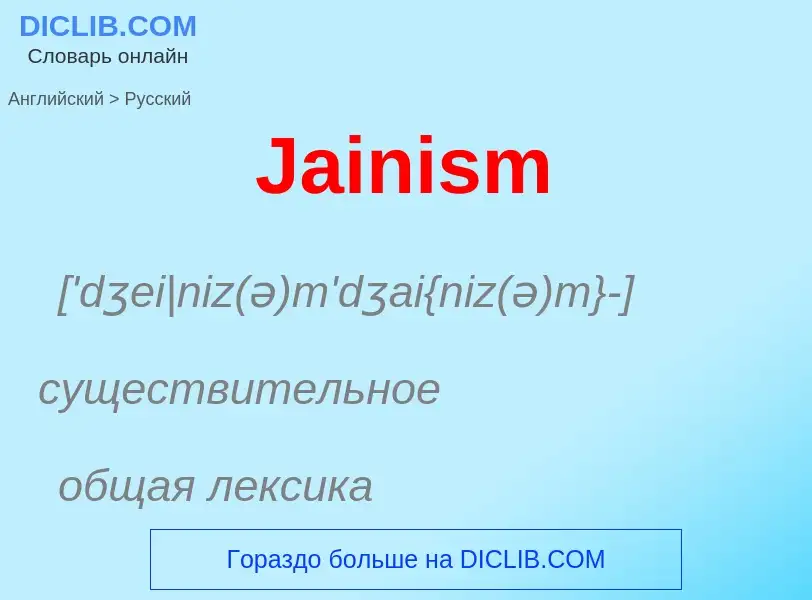Μετάφραση και ανάλυση λέξεων από την τεχνητή νοημοσύνη ChatGPT
Σε αυτήν τη σελίδα μπορείτε να λάβετε μια λεπτομερή ανάλυση μιας λέξης ή μιας φράσης, η οποία δημιουργήθηκε χρησιμοποιώντας το ChatGPT, την καλύτερη τεχνολογία τεχνητής νοημοσύνης μέχρι σήμερα:
- πώς χρησιμοποιείται η λέξη
- συχνότητα χρήσης
- χρησιμοποιείται πιο συχνά στον προφορικό ή γραπτό λόγο
- επιλογές μετάφρασης λέξεων
- παραδείγματα χρήσης (πολλές φράσεις με μετάφραση)
- ετυμολογία
Jainism - translation to ρωσικά
['dʒei|niz(ə)m'dʒai{niz(ə)m}-]
существительное
общая лексика
джайнизм (одна из религий в Индии)
[dʒeindʒain]
существительное
общая лексика
член общины джайнов
член индусской секты джайна (близкой к буддизму)
Ορισμός
Βικιπαίδεια
Jainism ( JAY-nih-zəm), also known as Jain Dharma, is an Indian religion. Jainism traces its spiritual ideas and history through the succession of twenty-four tirthankaras (supreme preachers of Dharma), with the first in the current time cycle being Rishabhadeva, whom the tradition holds to have lived millions of years ago, the twenty-third tirthankara Parshvanatha, whom historians date to the 9th century BCE, and the twenty-fourth tirthankara Mahavira, around 600 BCE. Jainism is considered to be an eternal dharma with the tirthankaras guiding every time cycle of the cosmology. The three main pillars of Jainism are ahiṃsā (non-violence), anekāntavāda (non-absolutism), and aparigraha (asceticism).
Jain monks, after positioning themselves in the sublime state of soul consciousness, take five main vows: ahiṃsā (non-violence), satya (truth), asteya (not stealing), brahmacharya (chastity), and aparigraha (non-possessiveness). These principles have affected Jain culture in many ways, such as leading to a predominantly lacto-vegetarian lifestyle. Parasparopagraho jīvānām (the function of souls is to help one another) is the faith's motto, and the Ṇamōkāra mantra is its most common and basic prayer.
Jainism is one of the oldest religions still practiced today. It has two major ancient sub-traditions, Digambaras and Śvētāmbaras, which hold different views on ascetic practices, gender, and the texts considered canonical. Both sub-traditions have mendicants supported by laypersons (śrāvakas and śrāvikas). The Śvētāmbara tradition in turn has three sub-traditions: Mandirvāsī, Deravasi, and Sthānakavasī. The religion has between four and five million followers, known as Jains, who reside mostly in India, where they number around 4.5 million as per the 2011 census. Outside India, some of the largest Jain communities can be found in Canada, Europe, and the United States. Japan is also home to a fast-growing community of converts. Major festivals include Paryushana and Das Lakshana, Ashtanika, Mahavir Janma Kalyanak, Akshaya Tritiya, and Dipawali.


![Gori Jain temples]] in [[Nagarparkar]], Pakistan, a pilgrimage site before 1947.<ref name=":0"/> Gori Jain temples]] in [[Nagarparkar]], Pakistan, a pilgrimage site before 1947.<ref name=":0"/>](https://commons.wikimedia.org/wiki/Special:FilePath/Gori Mandar.jpg?width=200)


![[[Kirti Stambh]] in [[Chittor Fort]], 12th Century A.D [[Kirti Stambh]] in [[Chittor Fort]], 12th Century A.D](https://commons.wikimedia.org/wiki/Special:FilePath/Kirti Stambha (Tower of Fame) (4571936260).jpg?width=200)
![Jain temple painting explaining Anekantavada with [[Blind men and an elephant]] Jain temple painting explaining Anekantavada with [[Blind men and an elephant]]](https://commons.wikimedia.org/wiki/Special:FilePath/Medieval Jain temple Anekantavada doctrine artwork.jpg?width=200)
![''Sivayasa Ayagapata'', with stupa fragment, [[Kankali Tila]], 75-100 CE. ''Sivayasa Ayagapata'', with stupa fragment, [[Kankali Tila]], 75-100 CE.](https://commons.wikimedia.org/wiki/Special:FilePath/Sculpture panel showing a Jain stupa and torana, Mathura 75-100 CE.jpg?width=200)
![[[Shikharji]] [[Shikharji]]](https://commons.wikimedia.org/wiki/Special:FilePath/Shikharji Parasnath Giridih.jpg?width=200)
![Praying at the feet of a statue of [[Bahubali]] Praying at the feet of a statue of [[Bahubali]]](https://commons.wikimedia.org/wiki/Special:FilePath/Shravanbelgola Gomateshvara feet prayer1.jpg?width=200)

![Idol of [[Suparśvanātha]] Idol of [[Suparśvanātha]]](https://commons.wikimedia.org/wiki/Special:FilePath/Thirthankara Suparshvanath Museum Rietberg RVI 306.jpg?width=200)
![[[Ranakpur Jain Temple]] [[Ranakpur Jain Temple]]](https://commons.wikimedia.org/wiki/Special:FilePath/Jain Temple Ranakpur.jpg?width=200)
![[[Dilwara Temples]] [[Dilwara Temples]]](https://commons.wikimedia.org/wiki/Special:FilePath/Delwada.jpg?width=200)
![Parshvanath Temple]] in [[Khajuraho]] Parshvanath Temple]] in [[Khajuraho]]](https://commons.wikimedia.org/wiki/Special:FilePath/Le temple de Parshvanath (Khajuraho) (8638423582).jpg?width=200)
![[[Girnar Jain temples]] [[Girnar Jain temples]]](https://commons.wikimedia.org/wiki/Special:FilePath/Jain temples on Girnar mountain aerial view.jpg?width=200)
![[[Jal Mandir]], [[Pawapuri]] [[Jal Mandir]], [[Pawapuri]]](https://commons.wikimedia.org/wiki/Special:FilePath/Jal Mandir.The Jain Temple at Pawapur,.jpg?width=200)
![[[Lodhurva Jain temple]] [[Lodhurva Jain temple]]](https://commons.wikimedia.org/wiki/Special:FilePath/Lodurva Temples.jpg?width=200)
![[[Palitana temples]] [[Palitana temples]]](https://commons.wikimedia.org/wiki/Special:FilePath/Palitana.jpg?width=200)
![[[Jain temple, Antwerp]], [[Belgium]] [[Jain temple, Antwerp]], [[Belgium]]](https://commons.wikimedia.org/wiki/Special:FilePath/Templejaindanvers.jpg?width=200)
![[[Brahma Jinalaya]], [[Lakkundi]] [[Brahma Jinalaya]], [[Lakkundi]]](https://commons.wikimedia.org/wiki/Special:FilePath/Jain temple at Lakkundi.jpg?width=200)
![[[Hutheesing Jain Temple]] [[Hutheesing Jain Temple]]](https://commons.wikimedia.org/wiki/Special:FilePath/Sheth_Hutheesinh_Temple.jpg?width=200)
